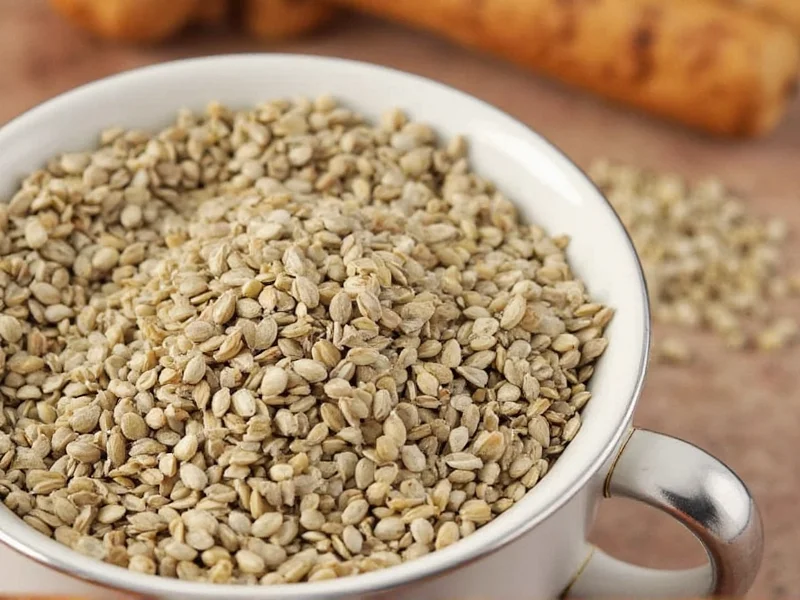When you're in the middle of cooking and realize you're out of caraway seeds, knowing reliable alternatives can save your recipe. Caraway seeds have a distinctive flavor—earthy with hints of citrus and anise—that's essential in many traditional dishes from Central and Eastern Europe. Understanding proper substitutions requires knowledge of flavor profiles and appropriate ratios to maintain your dish's integrity.
Understanding Caraway Seeds and Their Unique Flavor
Caraway seeds come from the Carum carvi plant and feature a complex flavor profile: earthy, slightly sweet, with warm citrus notes and subtle anise undertones. This distinctive combination makes them essential in traditional recipes like rye bread, sauerkraut, goulash, and certain cheeses. When seeking a caraway seed replacement, you're essentially looking for ingredients that can replicate one or more aspects of this multifaceted flavor.
Professional chefs often keep multiple substitutes on hand because different dishes require different aspects of caraway's flavor. For baking applications, the citrus notes matter most, while for meat dishes, the earthy warmth becomes more important. This context-specific approach to substitution separates adequate replacements from truly successful ones.
Top 7 Caraway Seed Substitutes with Exact Ratios
Not all substitutes work equally well in every application. The following table shows the most effective caraway seeds replacement options with precise ratios for different culinary contexts:
| Substitute | Standard Ratio | Best For | Flavor Notes |
|---|---|---|---|
| Dill seeds | 3:4 (¾ amount) | Rye bread, potato dishes | Milder, more herbal with similar citrus notes |
| Fennel seeds | 1:1 (equal amount) | Sauerkraut, vegetable dishes | Sweeter anise flavor, slightly less earthy |
| Anise seeds | 3:4 (¾ amount) | Baking, sweet breads | Stronger licorice flavor, less earthy |
| Cumin | 1:2 (half amount) | Meat dishes, stews | Earthy but more pungent, no citrus notes |
| Coriander | 1:1 (equal amount) | Lighter dishes, fish | Citrusy but milder, less anise flavor |
| Cardamom | 2:3 (⅔ amount) | Sweet breads, desserts | Complex citrus-spice, stronger flavor |
| Caraway extract | 1:8 (⅛ teaspoon per tsp) | Precise flavor control | Concentrated flavor, use sparingly |
Substitution Guide by Dish Type
Understanding what can I use instead of caraway seeds in sauerkraut versus rye bread is crucial for successful substitution. Different dishes emphasize different aspects of caraway's flavor profile:
For Baking and Bread Recipes
When making rye bread or other baked goods requiring caraway seed substitute for rye bread, dill seeds provide the closest flavor match. Use ¾ teaspoon of dill seeds for every teaspoon of caraway called for. The citrus notes in dill mimic caraway's bright top notes without overwhelming the bread's flavor. For sweeter breads like Irish soda bread, consider a 50/50 blend of fennel and coriander seeds to capture both the citrus and mild anise notes.
For Sauerkraut and Pickled Vegetables
Fennel seeds work best as a caraway seeds replacement in sauerkraut because they provide the necessary anise flavor without being overpowering. Use an equal amount of fennel seeds to replace caraway. If you find fennel too sweet, try a 3:1 blend of fennel to cumin to add some earthiness back into the equation. This combination maintains the traditional flavor profile while working with what's available in your spice cabinet.
For Meat Dishes and Stews
When preparing goulash or other hearty meat dishes, cumin makes an excellent caraway seed alternative for cooking, though you'll want to use only half the amount called for since cumin has a stronger, more pungent flavor. For a more complex substitute, try a blend of ½ teaspoon cumin plus ¼ teaspoon coriander for every teaspoon of caraway required. This combination captures both the earthiness and subtle citrus notes that caraway contributes to meat dishes.
What NOT to Use as Substitutes
Some common suggestions for caraway seed substitutes actually create flavor conflicts. Avoid using:
- Star anise (too strong and medicinal)
- Caraway powder (loses essential oils, flavor becomes bitter)
- Poppy seeds (no flavor similarity, just visual)
- Mustard seeds (completely different flavor profile)
Many online sources suggest using caraway powder as a substitute, but this actually creates a bitter, unpleasant flavor as the essential oils oxidize when ground. Whole seeds preserve the delicate flavor compounds much better.
Creating Your Own Custom Caraway Substitute Blend
For the most accurate caraway seed alternatives for baking or cooking, create a custom blend based on your specific needs:
Basic Caraway Substitute Blend
Mix together:
- 2 parts fennel seeds
- 1 part cumin seeds
- 1 part coriander seeds
Use equal amounts of this blend to replace caraway seeds. Toast the mixture in a dry pan for 2-3 minutes to release the essential oils before using for best results.
Storage Tips for Substitutes
Store any unused substitute blends in an airtight container away from light and heat. Whole seeds maintain their flavor for 1-2 years, while ground substitutes lose potency within 6 months. For the best caraway seeds replacement in recipes, always use fresh spices and toast them lightly before grinding or using.
When Substitution Isn't Possible
Sometimes, particularly in traditional recipes like authentic Hungarian goulash or German pumpernickel, caraway's unique flavor profile is irreplaceable. In these cases, consider making a smaller batch to test your substitute before committing to a large recipe. Alternatively, many specialty grocery stores now carry caraway seeds in the international foods section, and online retailers offer them with quick delivery—sometimes worth the wait for critical recipes.











 浙公网安备
33010002000092号
浙公网安备
33010002000092号 浙B2-20120091-4
浙B2-20120091-4